| Function | Technology |
|---|---|
| Push Notifications | Twiiio, Push.io, Amazon SNS, Urban Airship, Firebase, Cloud messaging |
| MS, Voice and Phone verification | Nexmo, Twiiio |
| Payments | Braintree & PayPal, Stripe, EWallets |
| Database | MongoDB, Hbase, Cassandra, Postgress, Mail Chimp, Integration, MySQL and Redis |
| Real-time Analytics | Hadoop, Spark, BigData, Apache Flink, Cisco, IBM |
| Find user location | Core location framework, Google places API, Google Maps |
| Server | NGINX |
| Framework | Laravel |
Table of Contents
Introduction
Since the last decade, the immense development of EVs has started a new revolutionary era of sustainable mobility solutions. We often encounter the statement from people that EV (electric vehicle) is the future. In fact, they are on the roads now! Adopting EV over IC engine vehicles is an excellent choice to protect the world from pollution and greenhouse gases vulnerability.
If we look at the current scenario, Tata, Mahindra, Hyundai, MG, BYD, Audi, Mercedes Benz, BMW, and Chevrolet are the top OEMs making their presence on the road with the most superior quality EVs in the Indian auto market. TATA Power, ABB India, and Delta Electronics India are some of India’s top EV charging station manufacturers catering to the fast DC charging solutions. From the consumer point of view, the Indian customers are optimistic about buying an EV, but at the same time are warry of the range anxiety and reaching the nearest charging station in time. The EV ecosystem is developing, and so is the market of the app for EV charging stations.
If you are planning to build an EV charging station finder app, this blog will help you get through the tech stack, the cost involved in EV charging app development, and its advanced features.
EV Charging Stations App Basics
An Electric Vehicle Supply Equipment (EVSE) or the EV charging station is the power source for the EV, just like a petrol station. Evident from the name itself, an EV charging station facilitates neighborhood EVs with electricity. Talking about the present times, companies are investing heavily in boosting the EV ecosphere.
From building fast DC charging stations to battery swapping to employing the right app for car charging stations, the process of EV charging station app development pulled the attention.
The EVSE is provided by electric utility companies in municipal parking locations or retail shopping centers by private companies. According to the standards of EV charging connectors, these charging stations provide special EV connectors such as CCS, ChadeMo & GB/T.
Before setting up and designing the stations, a lot has to be outlined. Not all EVs have similar charging requirements. Different EV charging stations deliver different charging speeds. Based on the EV charging connector types and charging speed, here is the classification:
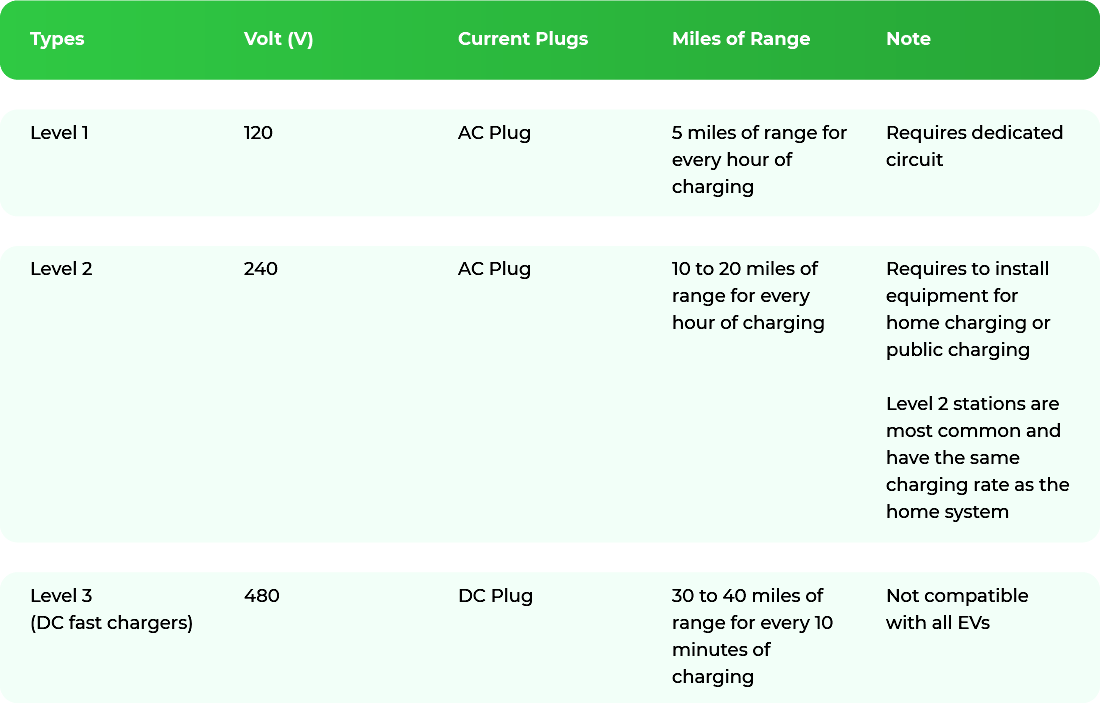
With the increasing demand for public charging stations for electric cars, the need for equipment supporting fast DC charging at higher currents and voltages has also increased. By providing publicly accessible charging stations, EV adoption is increasing exponentially worldwide.
Consequently, the demand for the best apps for finding EV charging stations apps is also increasing. The government, EV charging manufacturers, OEMs, and other liable entities have initiated their efforts rigorously to implement these network systems.
Let us understand how exactly the app for electric car charging stations works.
Less wait times=More charging
Take a glance at our DC fast charger to build your EV infrastructure today!
How Does EV Charging Station Finder App Work?
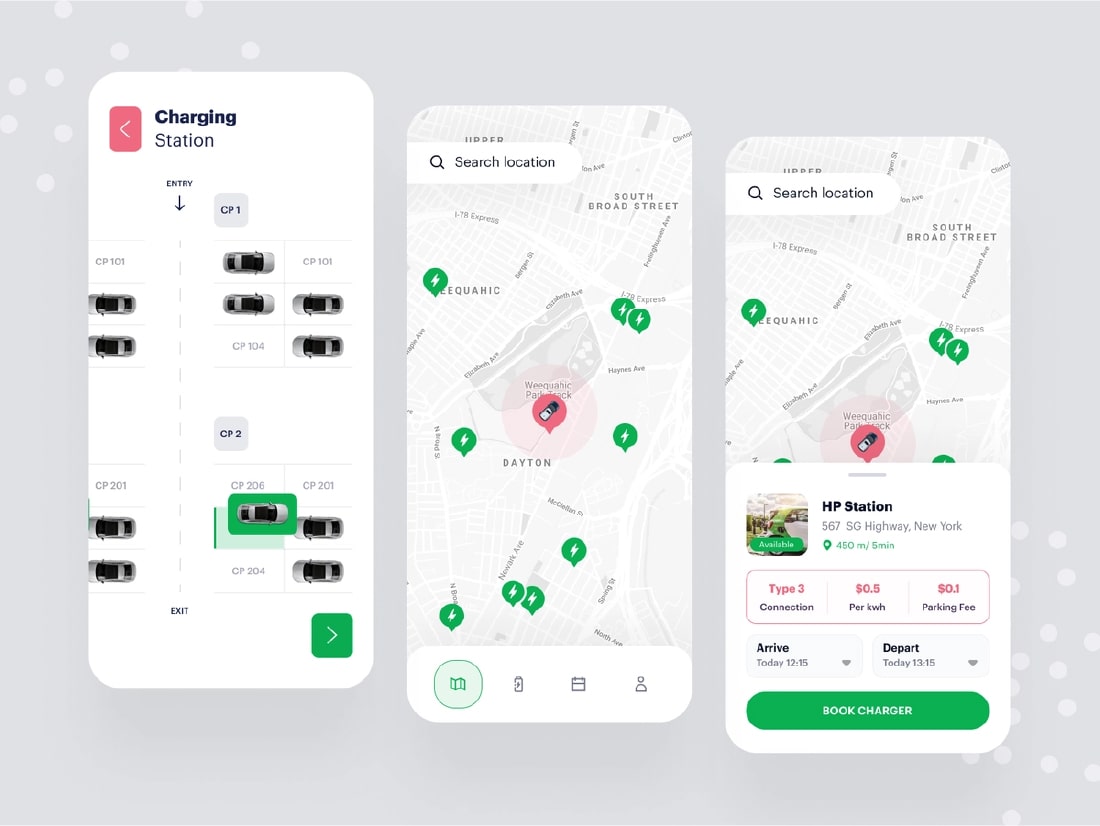
So far, you have gone through the building blocks of the electric vehicle charging station finder app development. A total of 1,640 EV charging stations have been set up PAN India till now. The next problem statement arises as to how can a user identify the best apps to locate an EV charging station? What if your EV runs out of charge? In such scenarios, the finder app for electric vehicle charging stations would be the need of the hour!
Here is how an EV charging station finder app works:
The EV charging station locator application provides the facility where finding charging stations in a given radius of km would be just a click away. Such an application would ease your process to find charging stations for electric vehicles and provides ratings, photos, real-time availability, and needed information of charging stations. Some of the applications also provide a feature that lets the users add the discovered charging points. Some of the applications also provide a feature that lets the users add the discovered charging points.
So far we have covered the working of the EV charging station finder app. Let us now delve into the technical stack, basic and expected app flow used to build the application.
EV Charging Station Finder App Tech Stack
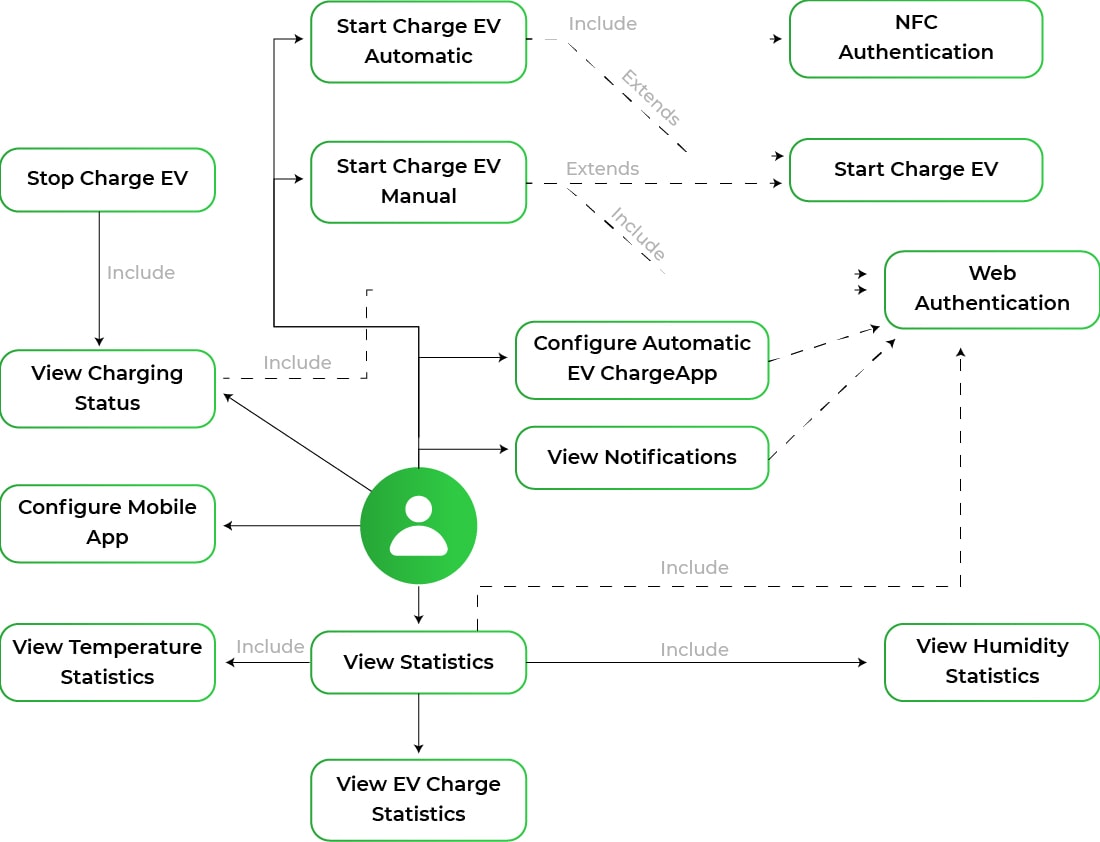
- Signup: After downloading the EV charging stations application, the app might ask you to sign up or log into the app with the help of social login.
- Discover the Nearby Charging Stations: Allow your current location access so that applications can know your location and display the list of charging stations.
- Enter Your Geolocation: Users can also enter the address manually from where they want to find the nearest station. This way, you can help someone else miles away using your application.
- EV Charging Station Details: The EV charging stations app can provide a list, grid, and map views displaying charging stations.
- In-app Navigation: Click on a particular station, and you can see the description, ratings, or provided information of that station.
The above stack build-up is a general layout for the app. Let us focus on the specific technical stack considering the requirements, functionality, and features.
Preferred Techstack: EV Charging Station Finder App
The technical stack can vary from application to application due to various development requirements, database, features, cloud requirements, server, and many other criteria.
Here is the tech stack of EV charging stations app, designed keeping in mind the fundamental and expected requirements and features. Let’s look at the development criteria of what to include when it comes to developing an EV charging station finder app.
Are you looking to develop an EV charging station app?
Hire Mobile App Developers to ramp up your development process at minimal market time.
How much does it cost to develop EV Charging Station Finder App
The time has come now to reveal the answer to the most-awaited question of this read- ‘What is the cost to develop EV charging station finder app?’
Well, the overall development cost of building EV charging stations app for Android and iOS depends on various factors as mentioned below:
- Region for app development you choose
- Features you want to integrate into your application
- The platform for your application
- The complexity of the application
- Time for developing the app
- Number of developers working on the application
- The architecture of the application
These are a few factors that affect the cost of app development. Despite these mentioned factors, the average ev charging app development cost ranges between $11,000 to $45,000. However, it app depends on the features and functionalities you want to implement.
Benefits and Features of EV Charging Station Finder Application
The following are the benefits and features of the app for electric car charging stations.
Benefits of EV charging station finder app:
- Saves Time: The application allows you to book the charging slot in advance and saves your time from waiting in the queue.
- Emergency: It is needless to point out that the app will locate the nearby stations at the time of urgency.
- Easy Transaction: You can easily transact the amount and keep the history of transactions in the app itself.
Features of EV charging station finder app
- Sign-Up
- Profile Creation
- Nearby charging stations
- Google Map View
- Geolocation
- Charging Station details
- Book Slot
- Reviews and Ratings
- Payment
- Transaction History
- Notifications
- Chatbot and Customer Support
- Rewards and Cashbacks
- Feedbacks
EV charging stations App: Providers and Consumers
Government and private industries are trying their best to provide as many electric vehicles as charging stations. With this consideration, the demand for EV charging station finder apps is also increasing.
Here’s the in-detail list of Electric Vehicles charging providers and consumers of EV charging stations.
EV charging Station Providers
Let us quickly go through the top providers of EV charging stations.
Shell
➡ Revenue- 180USD Billion
➡ Shell is a UK-based MNC providing services for electric vehicles and has set up around 1000 EV charging stations in the UK. Witnessing the rapid growth and the demand for charging stations in the near future, Shell is focussing on installing 5000 charging points by 2025.
Tesla Inc
➡ Revenue- 31USD Billion
➡ Tesla Inc is a US-based company manufacturing dynamic electric vehicles and battery-electric cars with several other products and services.
➡ In the past year, Tesla gained 16% of the EV market by selling maximum plug-in EVs and battery EVs. Till now, Tesla has offered a broad spectrum of EV charging stations, but only for Tesla EVs.
➡ Noticing the increase in the EV market, Tesla, in 2021, decided to provide charging networks for other electric vehicles.
Siemens
➡ Revenue- 31USD Billion
➡ Siemens is one of the largest companies in Europe, based in Munich, Germany, that provides products and services in different fields like healthcare, energy, electronics, and transportation.
➡ From basic charging to fast charging, Siemens has installed a number of charging stations and help in setting up the charging networks.
ABB
➡ Revenue- 26USD Billion
➡ ABB is a Switzerland-based global and versatile company providing products and services in different fields like robotics, power, automotive, and electrics.
Contributing to the EV development and services, ABB has set up basic as well as high-quality electric vehicle charging solutions, fast direct-current charging stations, and wall boxes.
These were a few providers who have contributed to the EV charging stations, solutions, or networks. Moving on toward the consumers of EV charging stations.
EV charging stations for Consumers
Here is the list of how EV charging stations apps and solutions would be useful for you based on the domain application.
- Fleet Organization
- Residential
- Offices and Workplaces
- EV Manufacturers and Dealership
- Research
- Public Charging
- Malls and Hotels
These are the benefits which are provided by consumers
- Receives end-to-end services and maintenance.
- Provides Content Management System software for EV management.
- EV smart and safe charging solutions
- Few providers have exclusive offers as per the requirements.
Here is the bonus information for you! Let us throw some light on the advanced features of the EV charging station app.
Advanced Features of EV Charging Station Finder App
There’s a wide range of possibilities for enhancing the application by adding a few advanced features. The futuristic application can possibly consist of the following features.
In-Application Navigation: For making the navigation easy and smooth, the application, with the help of the Google Maps API, navigates you to the station without hustle.
- Multiple Payment Mode: Single-mode of payments is unfair, so the app should allow multiple payments while the diversity of payment modes is in mind. This helps the user to transact more conveniently.
- GPS Tracking: It is quite similar to In-Application Navigation. For security concerns, the application can include GPS tracking.
- CRM Integration: For constant support, CRM integration is beneficial.
- Loyalty programs: Such programs and policies help users to trust the application.
We have covered the market requirements, business applications, technical requirements, features and benefits of the EV charging station app till now. For a comprehensive analysis of the EV ecosystem, let us look at the types of electric vehicles.
Types of Electric Vehicles: HEV, PHEV, BEV
Electric vehicles can be further classified into various categories, but three of them are most important-
- Hybrid Electric Vehicle (HEV)
- Plug-in Hybrid Electric Vehicle (PHEV)
- Battery Electric Vehicle (BEV)
Let’s see each of the above-mentioned electric vehicles types in detail.
Hybrid Electric Vehicle (HEV)
A HEV- Hybrid EV is a combination of a conventional ICE, i.e., an internal combustion engine with an electric motor and battery pack to consume lesser fuel.
HEVs can reduce fuel consumption by using the electric motor when ICE becomes inefficient. A hybrid vehicle can also switch to ICE when it seems to have more efficiency than electric motors. Hybrid vehicles are the most familiar to ICE vehicles, so people find it more comfortable to drive.
Plug-in Hybrid Electric Vehicles (PHEV)
Plug-in Hybrid Electric Vehicles are similar to hybrid vehicles, although have a few distinct differences.
Compare to HEVs; plug-in hybrid vehicles consist of larger battery packs and powerful electric motors. PHEVs have the capability to be driven in electric-only mode, which switches off the ICE completely. Driving a PHEV is quite similar to driving an HEV because the car will automatically switch from TCE to an electric motor, or vice versa, as per the conditions, and also recharge the battery.
However, the driver has a choice of topping up the vehicle with both fuel and electricity. A PHEV can be driven on just battery charge if there’s no fuel and on fuel if the battery is not charged.
Battery Electric Vehicle (BEV)
A battery EV is said to be a full-electric car. Battery electric vehicles don’t have an internal combustion engine and are fully powered by electricity- their electric motors withdraw current from the battery packs.
Since BEVs are exclusively electric cars, they have batteries with much higher capacities and kWh outputs compared to HEVs and PHEVs. Because of this, the cost of battery EVs is comparatively more than other electric vehicles.
Future of EV charging stations
Witnessing the progress of EVs, in the automotive and technical sectors, it’s crystal clear that electric vehicles hold immense potential, and there’s a lot more to explore yet and they can definitely offer a sustainable future.
With the rapid development of EVs in the past few years, the global electric car stock in 2021 hit more than the 10 million mark, a 46% increase compared to 2020. Despite the COVID-19 pandemic, electric cars managed to hold their position in the automotive industry.
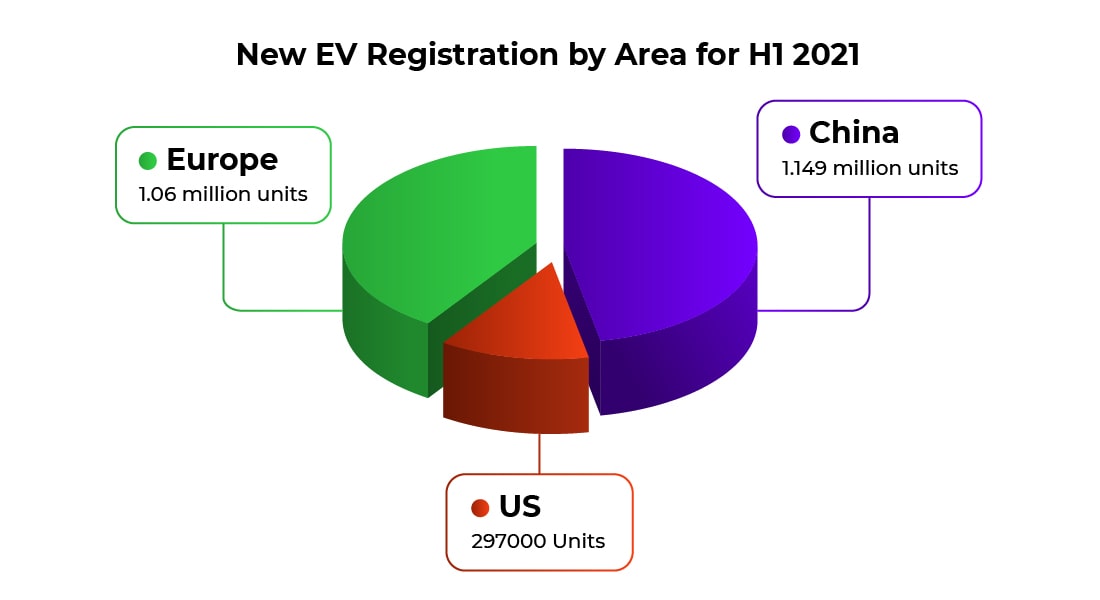
On transitioning the vehicles to HEVs or PHEVs using the technology, we can lessen the foreign oil dependency by 30% to 50% and also, reduce the carbon pollution by 20%. Moreover, the statics have shown that most of the leading countries have taken the decarbonization challenge seriously and are moving towards electric vehicles.
2021 – A game-changer in the history of electric vehicles sales.
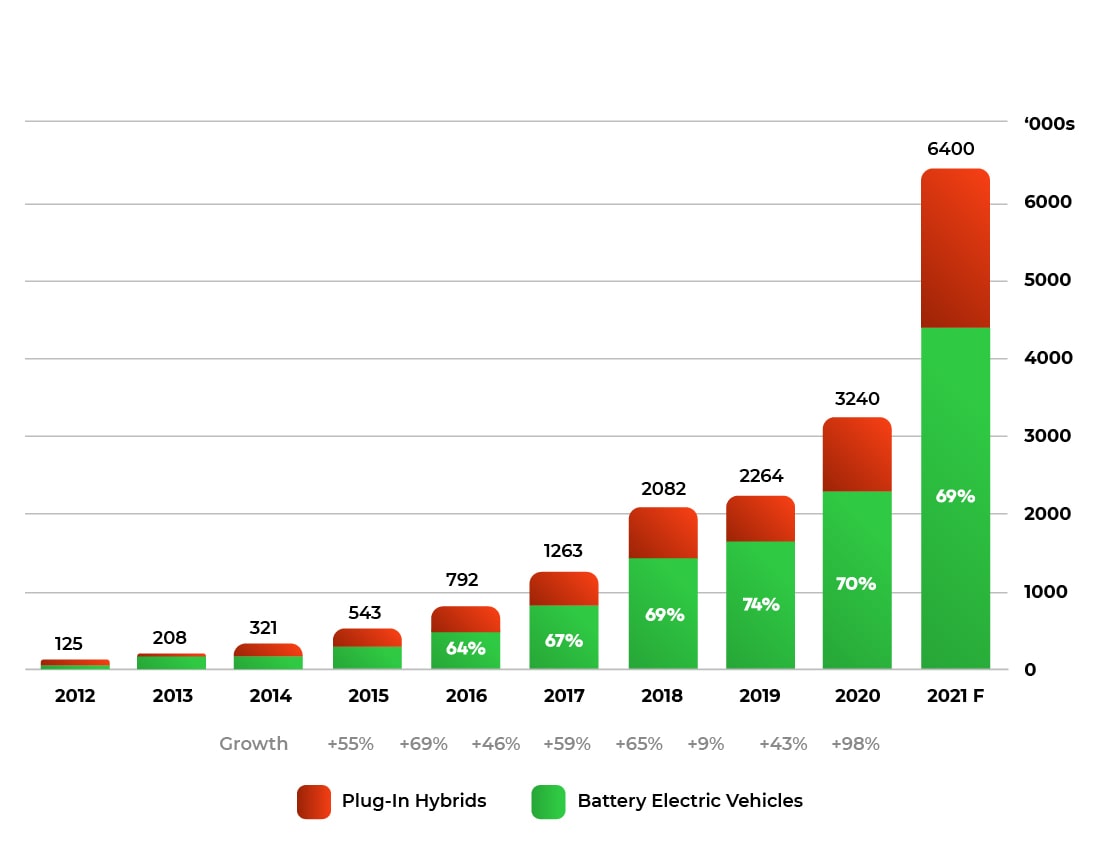
The largest automotive sector will shift to electric by 2030. Under the expected regulatory targets, 45% reach is expected from electric vehicles adoption.
Without any doubt, the future roads of the leading countries would be ruled by Ev cars, EV charging stations, and EV Charging apps with the help of AWS IoT; because of electrification, the world will not be vulnerable to gases.
Key Takeaway
With the much advancement in EV charging stations finder app development, EV is undoubtedly the future. Google Play Store and App store have already started flooding with the best apps for finding EV charging stations. Bacancy has been a renowned name in app development for more than a decade, and with our extended venture Bacancy Systems, we can be your one-stop-shop for hardware & software development services.
So, suppose you are looking for a helping hand to build a charging spot finder app or need hardware engineering assistance with the EV charging stations app. In that case, we can ensure you the futuristic solution surpassing your expectations and competition.
Your Success Is Guaranteed !
We accelerate the release of digital product and guaranteed their success
We Use Slack, Jira & GitHub for Accurate Deployment and Effective Communication.



